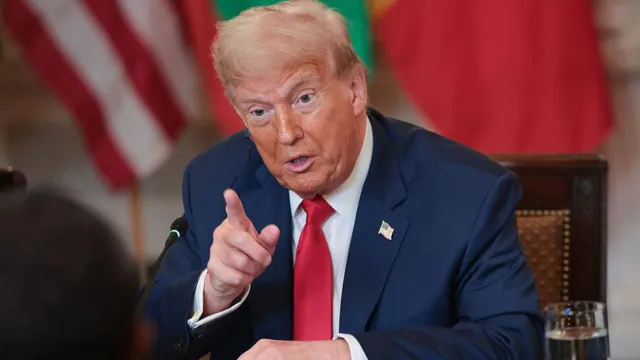Trump Imposes 30% Tariffs on EU and Mexico, Citing Trade Imbalances and Security Concerns
Trump Imposes 30% Tariffs on EU and Mexico, Citing Trade Imbalances and Security Concerns
In a significant escalation of his trade policies, former President Donald Trump has announced that the European Union and Mexico will face a steep 30% tariff on all imports into the United States, effective August 1st. This move, stemming from Trump’s long-standing critique of global trade imbalances and perceived unfair practices, targets the EU as America’s largest trading partner and Mexico, citing concerns over border security and the drug trade.

The announcement, communicated through letters to European Commission President Ursula von der Leyen and Mexico’s leadership, emphasizes Trump’s intent to dramatically reshape international trade relationships. The core justification provided for these tariffs is the persistent trade deficit the U.S. experiences with these partners, which Trump attributes to their “tariff, and non-tariff, policies and trade barriers.” He explicitly stated that the U.S. trading relationship has been “far from reciprocal,” setting the stage for a potentially contentious period of international economic relations.
Trump has also indicated a willingness to impose even higher tariffs should either the EU or Mexico retaliate with their own import duties against the United States. This threat underscores a protectionist stance aimed at compelling concessions and realigning trade dynamics in favor of American interests. The administration has previously targeted other major economies, including Japan, South Korea, Canada, and Brazil, with similar tariff threats, signaling a broad application of this policy across multiple global markets.
EU’s Response and Concerns
The European Union, a crucial economic ally, has expressed a desire to reach an agreement with Washington before the August deadline. However, negotiations appear to have stalled, with no significant progress announced. The EU maintains its commitment to fair trading practices and has stated its readiness to defend its economic interests, hinting at the possibility of “proportionate countermeasures” if necessary. Leaders like Italian Prime Minister Giorgia Meloni and Dutch Prime Minister Dick Schoof have voiced concerns about triggering a trade war, emphasizing the need for a mutually beneficial agreement across the Atlantic.
The economic implications for key European industries, such as Germany’s automotive sector, are significant. The Association of the German Automotive Industry has warned of rising costs for manufacturers and suppliers, regretting the potential escalation of the trade conflict.
Mexico’s Trade Relations and Security Concerns
Regarding Mexico, Trump’s decision is linked not only to trade deficits but also to his administration’s focus on border security and combating drug trafficking. He conveyed that Mexico has been assisting in securing the border but asserted that “what Mexico has done, is not enough.” The specifics of whether goods traded under the United States-Mexico-Canada Agreement (USMCA) would be exempt from these new tariffs remain unclear, adding another layer of uncertainty to the bilateral economic relationship.
The U.S. trade deficit with the EU in 2024 alone was a substantial $235.6 billion, highlighting the scale of the imbalances that Trump seeks to address. This proactive tariff imposition strategy, which has now targeted two dozen countries and the EU, aligns with an earlier White House objective to secure numerous trade deals within a short timeframe. While some initial agreements have been outlined with the United Kingdom and Vietnam, the broader impact of these aggressive trade measures on global economic stability remains a subject of intense scrutiny.
Broader Context of Tariffs
These recent actions by the Trump administration are part of a wider pattern of imposing tariffs as a tool of foreign and economic policy. The effectiveness and consequences of such tariffs on the U.S. economy and global trade relationships continue to be debated, with various analyses examining their impact on prices, employment, and economic growth. The administration’s approach signals a departure from traditional trade diplomacy, prioritizing bilateral negotiations and leveraging economic pressure to achieve its objectives.



Post Comment